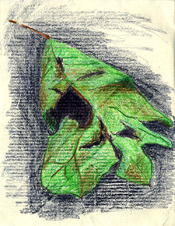Sunset, Wednesday, 2 December 2009
 William Theodore Van Doren. Stony Point, Albemarle County, Va. Oil on paper, 16 x 20.
William Theodore Van Doren. Stony Point, Albemarle County, Va. Oil on paper, 16 x 20.
I’m sure there are plenty of other bloggers who have to fix a chainsaw in the pouring rain while composing an entry and watching the sunset in order to post a daily painting. We could form a professional association. The name doesn’t really matter, as long as it makes the acronym M E N T A L.
I’ve been catching up with an old friend who was a significant person in my life, and she wrote something I found quite striking. We were both once strict “laissez-faire libertarians,” part of a group that, at the time, would have objected to being labeled ‘conservative’. However, conservative is what we were, when you get down to it; some in our old cohort have even since slithered on over into that grotto called neoconservatism.
In any event, her comment was somehow the most accessible explanation I’ve seen for why a person would mature into a liberal.
I have moved way across the spectrum since the early days of knowing you and today would shamelessly describe myself as a tax-and-spend liberal. One of my biggest frustrations is with the reluctance of the American people to devote themselves and their money to creating a more robust community and to assuring a more satisfying life experience for others sharing the planet at the very same moment in time.
Simple humanity and common sense.
 Wednesday, December 2, 2009 at 05:46PM | by
Wednesday, December 2, 2009 at 05:46PM | by  BVD | in
BVD | in  A Painting A Day,
A Painting A Day,  Sunset Paintings | tagged
Sunset Paintings | tagged  Ayn Rand,
Ayn Rand,  Objectivism,
Objectivism,  firewood,
firewood,  liberalism,
liberalism,  libertarianism,
libertarianism,  politics,
politics,  rain | | Comments Off
rain | | Comments Off 






Sunset, Sunday, 15 November 2009
Having been for a long time – too long a time, about eight years, from age 16 to 24 – a devotee of Ayn Rand and Objectivism, I don’t think I can stand to read the two recent Rand biographies, even though they’re the first to be done by people outside her camp. About the most I could manage was to read the lengthy review by Thomas Mallon in The New Yorker. Mallon makes a number of excellent observations, including various ways Rand manifested behavior that was exactly the opposite of the qualities she espoused – for example, prizing meek compliance by others with her every view while publicly claiming to worship the character trait of independent thinking.
There’s only one contribution I’ve ever wanted to make to the discussion of the life and work of Ayn Rand, and Mallon comes very close to taking care of it in his review, when he writes:
Along those lines, what I’ve wanted to say – hey, I’ve been saving this up since 1972, ever since I began to notice that the thought progressions in The Ayn Rand Letter were, beneath their confidently hard-waxed surface, positively deranged – is that Rand ultimately relied on the use of literally compelling rhetoric rather than on the actual content of ideas. In other words, her chief weapon – and it was exactly that – was a device she condemned, and which she called “the argument from intimidation.” You can find it defined in a really scary website assembled by her disciples, the Ayn Rand Lexicon.
Rand made her living rendering rhetoric that would be so forceful, so powerfully, even sometimes beautifully symmetrical, so ruthlessly logical in its sound and its appearance, once you allowed yourself to step inside its force field, you could be overwhelmed. There would appear to be no escape. But it only looked logical. It sounded rational. It was in fact a fantastic structure based on a profound desire to make the world conform to what she wished it to be in her mind, which became the will to intimidate.
O.K., I feel better now.
For anyone interested in the American right wing’s attempts to claim Ayn Rand as part of its ideological heritage, I strongly recommend a recent post on DailyKos, “The Ayn Rand Myth” by Laurence Shatkin.